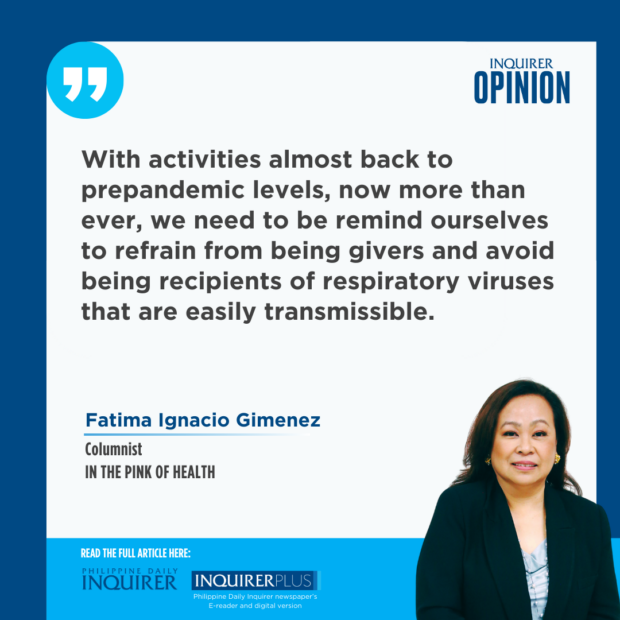
I have an upcoming travel to China . Can I still go ahead with my travel plans?”
“We came home from Hong Kong and imported a bad case of cough and colds.”
“My son relayed that a lot of people were coughing on the plane, are restrictions soon to be put in place?
“Do we need to bring antibiotics with us on our trip?”
Sitting in an after-conference huddle, a colleague asks if the rumors circulating are true. Who can be blamed for asking? When one comes across reports of a new virus in China, one worries.
The question that followed was, do we have a system in place ? It is with a sense of pride and relief that the country has implemented an integrated respiratory surveillance system which monitors influenza-like illness (ILI), severe acute respiratory illness (SARI), SARS-CoV-2, and human avian influenza. Last year, the respiratory syncytial virus made headlines and plans are underway for its inclusion. To give an idea of the most prevalent causes, data gathered from a report from the RITM website, from the period of January 2023 to June 2024, influenza was the most dominant cause of ILI, with influenza A (H3) as the leading subtype. For both ILI and SARI, the human rhinovirus (HRV) was the major etiologic agent that was detected.
Last Jan. 7, the World Health Organization (WHO) released a situationer on trends of acute respiratory infections in the Northern Hemisphere. The Philippines together with China are two of the countries included. The cause of concern came from the reported upsurge of seasonal influenza, respiratory syncytial virus, and human metapneumovirus (hMPV) from data up to the period of Dec. 29, from the Centers of Disease Control of China which includes routine surveillance of these pathogens together with other common respiratory viruses. Cognizant that hMPV is not as familiar to the public nor is it included in the country’s surveillance, as in the case for most countries, it is understandable that anxiety levels are raised. Locally, our numbers are derived from pricey respiratory panels that are available in a handful of hospitals. Looking at the trends, the report says that the reported increase in numbers is seasonal and expected at this time of the year and that upon “current risk assessment, there is no reason for trade or travel restrictions.”
At this point, hopefully some fears have been allayed. Nevertheless, there is no reason to let our guard down even with the knowledge that these viruses cause mild and self-limiting infections for there is a growing number of immunocompromised populations. Whether genetic or acquired via a medical condition, these individuals because of their decreased immunity, may not be as fortunate to clear or survive the infection. With activities almost back to prepandemic levels, now more than ever, we need to be remind ourselves to refrain from being givers and avoid being recipients of respiratory viruses that are easily transmissible. As to how, we know the drill. Wash hands regularly, cover your cough or your sneeze, and wear a mask when necessary. If feeling ill or sick, isolate and avoid going to public places. Make sure that your homes or work areas are properly ventilated. Ensure that you obtain the necessary immunizations in a timely fashion. Seek consult and do not attempt to self-medicate. Aside from unnecessary expenses, you wouldn’t want to be a proud donor to the ongoing problems in antimicrobial resistance.
While we are all caught up in problems that are respiratory in nature, let us also not forget that other endemic diseases are also on the rise. In the health calendar, January is neglected tropical disease month. Let me zero in on dengue and how we continue to suffer from mortalities despite achieving moderate success in its management, which has translated to improved survival rates. More often than not, deaths could have been avoided if the patient was brought in for an early consult. From the standpoint of many and to which most experts agree, the solution is multipronged and involves not only vector control, but improved surveillance, proven evidence based guidelines on recognition and management of disease, development of new tools, improvement in vaccines and should be one of the topmost priorities in the global health agenda.
As ordinary citizens, we can also do our share. Keep your surroundings and environment clean. Seek early consult if you have had fever of more than two days. Signs and symptoms may be nonspecific and may resemble that of influenza. In practice, most patients complain of headache, extreme body malaise, a markedly decrease in appetite, and some may manifest with overt bleeding. The latter is a danger sign and we wouldn’t want to get to this point at all costs. Currently, there is no antiviral or cure to dengue and management is mostly supportive. It is safe to use paracetamol, avoid the use of ibuprofen or worse, resort to a combination of both. Adequate hydration with an appropriate oral hydration is key together with seeking early consult.
Prevention is key.
—————
timmygimenez@gmail.com

